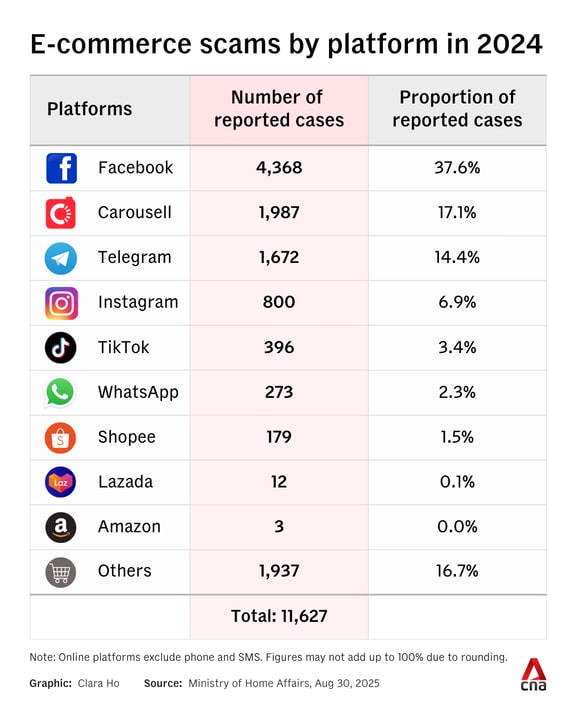Facebook Marketplace remains lowest of six e-commerce platforms on anti-scam rating system

A person shopping on a mobile phone with a debit card. (File photo: iStock)

This audio is generated by an AI tool.
SINGAPORE: Facebook Marketplace was rated the lowest out of six e-commerce platforms for the anti-scam measures it has in place to ensure the security of online transactions, the Inter-Ministry Committee on Scams (IMCS) said on Saturday (Aug 30).
The findings were published in the 2025 E-commerce Marketplace Transaction Safety Ratings (TSR), which is a yearly update to the ratings given to major e-commerce platforms based on their latest anti-scam features.
Of the 11,627 e-commerce scam cases via online platforms reported in 2024, 37.6 per cent - 4,368 cases - happened via Facebook, which marked the highest number among the platforms.
Facebook Marketplace was awarded one tick, the lowest of four ratings on the TSR. It has been ranked last since the TSR was launched in 2022.
Meanwhile, Carousell received two ticks, while Amazon, Lazada, Shopee and TikTok Shop - were awarded four ticks. This is the first time TikTok Shop was included in the TSR.
The TSR serves to provide consumers with information on the anti-scam measures that major e-commerce platforms have in place.
The overall safety rating assigned to each platform shows the extent to which there are measures implemented to protect consumers against e-commerce scams.
Such measures relate to user authenticity, transaction safety, availability of loss remediation channels for consumers, as well as the effectiveness of their anti-scam measures.
E-commerce platforms with all the critical anti-scam measures in place, and which, as a result, have a lower number of scams perpetuated on their platforms, are awarded the full four ticks.

Carousell had 17.1 per cent of reported scam cases in 2024 on its platforms. TikTok and Shopee saw 3.4 per cent and 1.5 per cent of cases respectively, while Lazada and Amazon had 12 and 3 cases respectively.
E-commerce scams remain one of the top scam types in Singapore, said the IMCS. There were 11,665 total reported e-commerce scam cases in 2024, marking an increase of 19.2 per cent from the 9,783 cases reported in 2023.
Out of the 11,665 cases, the majority - 11,627 scam cases - originated from online platforms, with the remaining through other platforms such as SMS and phone calls.
Such scams generally involved the sale of goods and services online that were not delivered after payment was made.
MEASURES TAKEN BY PLATFORMS
In June last year, the Ministry of Home Affairs (MHA) said it would require both Facebook Marketplace and Carousell to verify the identity of all their sellers if the number of scams reported on their platforms "does not drop significantly" over a six-month assessment period.
In a review in March, the ministry noted that the number of reported scams on Carousell fell by about 11 per cent over the period, which it said "was not a significant decrease". It added that it will continue to monitor the situation and that it may require Carousell to verify the identities of all sellers by Oct 1.
For Facebook Marketplace, MHA said it will not extend the enhanced verification requirement to all Marketplace sellers as the number of reported scams on the platform fell by about 55 per cent over the period, which it deemed as a "significant improvement".
IMCS on Wednesday said it has been working with the major e-commerce platforms to enhance the safety of online transactions, and that the two lowest-ranked platforms - Facebook Marketplace and Carousell - have put in place various anti-scam measures.
It said that Facebook Marketplace has implemented "enhanced user verification measures for select marketplace sellers" in Singapore, and had also put up notices in product listings and its messenger app to warn consumers of the risk of e-commerce scams.
Carousell has also required Singpass verification for users who displayed "behaviours similar to known scam patterns or policy violations" since June 2024, IMCS said. From January this year, sellers could also get a verified badge after completing the Singpass verification.
"With the strengthening of anti-scam measures on conventional approach tools such as SIM cards, scammers have been pivoting to online platforms to approach scam victims," said Minister for Digital Development and Information Josephine Teo.
She added that the government "will not hesitate to use legal powers to compel online platforms to implement anti-scam measures if it is necessary to protect Singaporeans from scams".
"At the same time, we encourage consumers to exercise due diligence by checking that sellers are verified and using secured payment options."

















